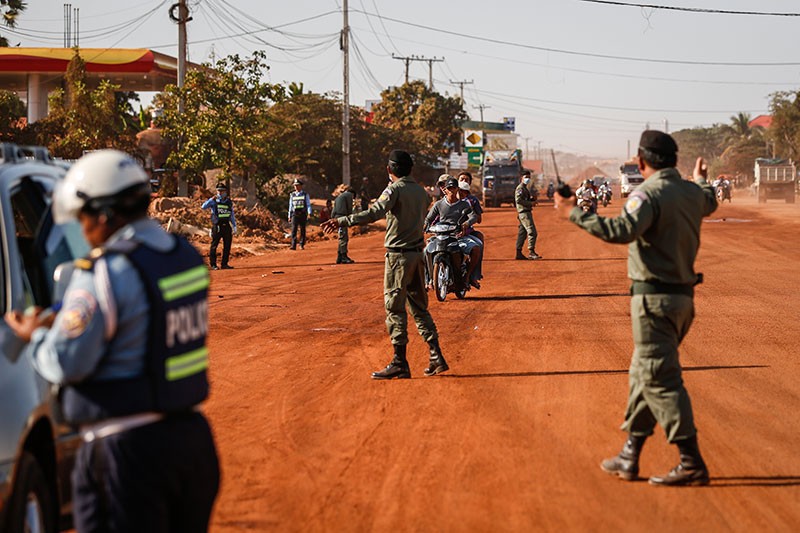Cambodia’s new Land Traffic Law came into swift effect on Friday, with more than 7,000 vehicles pulled over across the country for various violations, according to police.
The law includes harsher penalties for offenses such as speeding and drunk driving, limits motorbike passengers to one adult and one child, and requires all passengers to wear helmets.

Officers who pull over motorists are no longer allowed to collect fines on the spot, but now get to keep 70 percent of the fines they collect, up from the 50 percent they were due previously.
While a noticeably higher proportion of motorbike passengers were wearing helmets on the busy streets of central Phnom Penh on Friday, deputy National Police commissioner Him Yan said officers stationed along major highways and city streets stopped 7,519 vehicles nationwide—two-thirds of them motorbikes.
“We educated the drivers of 4,543 [motorbikes] and fined 2,925 drivers of [all] vehicles,” Lieutenant General Yan said during a press conference at the National Police headquarters on Friday evening, adding that while the motorbike drivers who were “educated” were not fined, police impounded 110 motorbikes with no license plates.
Lt. Gen. Yan said all 1,750 of the country’s traffic police officers were on the lookout for license plate, seat belt and helmet violations on Friday, but explained that their main task was to increase awareness of the new law.
“We need to take more time to change the attitudes of people,” he said. “We cannot do everything by forcing it immediately.”
The general added, however, that the public should be prepared for police to slowly begin enforcing fines over the coming days—like “gradual rain.”
“If no fines are imposed, the attitudes of drivers will create danger forever, and damage public order,” he said.
On Wednesday, helmet sellers in Phnom Penh said they had experienced a sharp increase in sales in the lead up to Friday.
“In the past 15 days of this month, there were a lot of people coming to buy helmets,” said Y Srey, 33, a vendor near Tuol Tompoung market.
“There were about 50 to 60 helmets sold per day, compared to the past couple months, when only 10 to 20 helmets [were sold each day],” she said.

Chhiv Y, 27, who sells helmets ranging from $2.50 to $60 at a shop on Monireth Boulevard, said her sales had also increased dramatically, but noted that customers appeared to be motivated only by the threat of fines, and not by safety concerns.
“Most people, they like only to spend like $2.50,” she said. “Not to protect themselves, but just to avoid the police catching them.”
Ms. Y said she had attempted to convince her customers to invest in more expensive helmets, but that most did not believe pricier models were actually safer.
“They don’t trust…that the helmet can protect them,” she said.
“When we tell the customer that you have to get the good one so that the helmet can protect you, the reply is that ‘When the car hits you, you are going to die anyway.’”
A 2008 study by Dynamic Research found that just one out of 12 helmets in Cambodia passed all testing criteria for helmet safety set by the Global Road Safety Partnership.
“Wearing a helmet that’s not certified or up to standard is like not wearing a helmet at all,” Ear Chariya, a road safety consultant, told reporters in November.
Moto-taxi driver Touch Chendavuth said on Friday that he had purchased a helmet for his passengers in order to avoid fines.
“I bought a helmet yesterday costing $3.50 for passengers because the new law’s fine is a lot of money,” Mr. Chendavuth said, adding that he felt the law was unfair, with even a cheap helmet putting a sizeable dent in his meager income.




